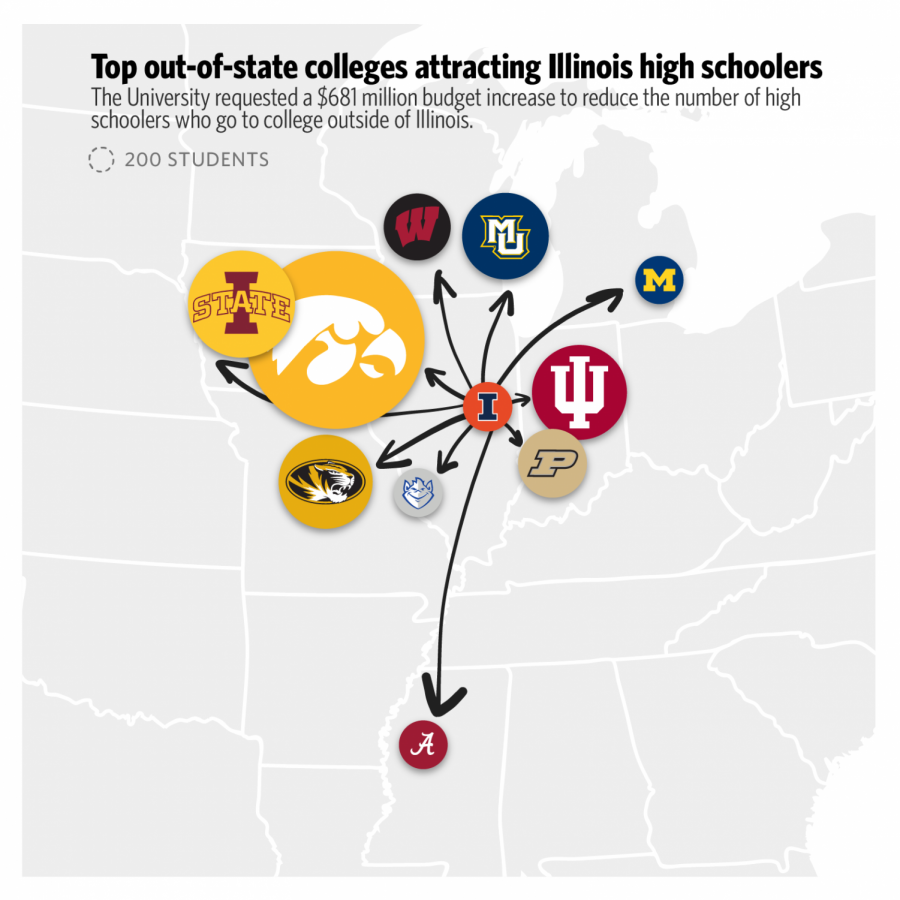Increase in UI budget request to help retain in-state enrollment
Source: Illinois Board of Higher Education
April 19, 2018
Lucrative financial aid deals from out-of-state schools, drawing Illinois high school students away from the state, has partially fueled the five-percent increase in the University’s $681 million budget request for state aid.
The increase would allocate $10 million toward scholarships for undergraduate Illinois residents, $10 million toward faculty recruitment and retention, and $11 million toward addressing facility needs, said Jennifer Creasey, senior director of state relations for the University of Illinois system.
“We’re obviously concerned that lots of schools in competing states are trying to compete for Illinois students. We know that many times, they are trying to give them scholarships, grants, awards to make them seem on par with our costs,” said Dan Mann, interim associate provost for enrollment management. “We have chosen here to provide most of our financial aid as need-based financial aid instead of merit-based.”
According to the Illinois Board of Higher Education, the number of Illinois residents migrating out of the state for their college educations has steadily increased over the past decade, from more than 25,000 students leaving the state in 2006 to over 35,000 leaving the state in 2016.
As of 2016, universities in Iowa, Indiana, Missouri and Wisconsin have drawn the most Illinois students, with 1,690 Illinois residents attending the University of Iowa alone.
Get The Daily Illini in your inbox!
“Some of the lower-populated states just don’t have enough high school graduates within their state,” Mann said. “Iowa is an example of that, so they need to bring students from Illinois and other states to meet their enrollment goals.”
Andy Borst, director of undergraduate admissions, said the University is focused on ensuring affordability for Illinois residents, meaning the bulk of financial aid distributed by the University is need-based and goes primarily toward Illinois residents.
More than 70 percent of students enrolled at the University are Illinois residents, outpacing most other Big Ten universities.
Borst said the additional money directed toward need-based scholarships could incentivize Illinois high school students who are offered merit-based scholarships from out-of-state schools to stay in Illinois.
“I have confidence that for some families, we may cost more to attend, but the return on investment far exceeds many other institutions they may be looking at,” Borst said, citing the University’s higher graduation rates, starting salaries and signing bonuses.
The University’s 70-percent four-year graduation rate is higher than the University of Iowa at 51 percent, Indiana University at 60 percent and the University of Alabama at 44 percent, according to the U.S. News website.
Borst said the University plans on receiving a freshman class of 7,500 students for fall 2018, which would constitute a record enrollment, in order to replace a relatively smaller graduating class, but it is not looking to further grow undergraduate enrollment beyond 2018.
Instead, Creasey said the University will be seeking to expand enrollment in online and graduate programs as part of the overall budget.
University President Timothy Killeen has spoken in front of the appropriations committees in the House and Senate to advocate for the budget request, emphasizing the University’s tuition freeze, student success and enrollment of Illinois residents.
Creasey said the tone among legislators has been markedly more positive than previous years after the two appropriations hearings.
“I have no idea (if the funding request will be approved),” Creasey said. “We’re coming off a pretty bad budget battle, so everyone’s kind of holding their breath to see what’s next.”







